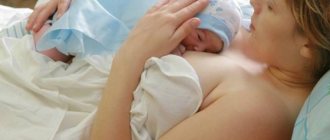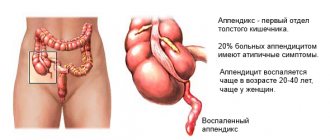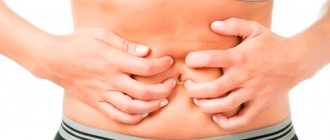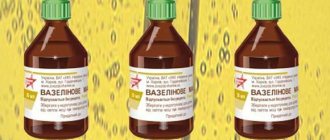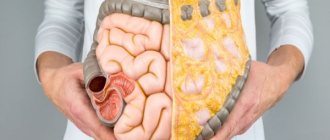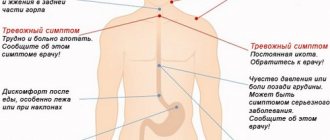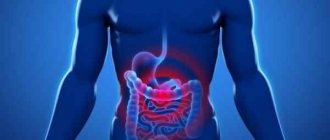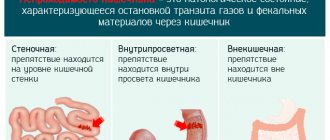How much does your stomach hurt after childbirth?
Childbirth is associated with significant changes in a woman’s body. This is what explains the occurrence of pain after the birth of a child. During the postpartum period, women are always more busy with the child than with themselves, so they rarely pay attention to pain, believing that they are the norm, but this is not always the case.
Norm
The main reason for stomach pain after childbirth is contraction of the uterus. Cramping pain, reminiscent of labor pains, may intensify during breastfeeding. This is explained by the fact that at this moment oxytocin is produced. This substance enhances the contraction of the uterine muscles. This means that the more often breastfeeding occurs, the faster the uterus recovers and the pain decreases.
In addition, tissue ruptures and sprains often occur during childbirth. The abdominal pain associated with this is natural. In such cases, it is very important to ensure that no complications arise. If a cesarean section was required for delivery, then as a result of the operation, a scar remains on the uterus, which will hurt after childbirth. Abdominal pain will disappear only after complete healing. To prevent the seam from coming apart, you must follow all the doctor’s recommendations.
Deviations and pathologies
When your stomach hurts after childbirth, you can suspect the development of pathological conditions and abnormalities. In particular, pain can also occur due to the fact that some clots, remnants of epithelium, pieces of the placenta or fertilized egg remain in the uterus. Usually a couple of days after birth, an ultrasound is performed. Based on it, if necessary, special agents are prescribed that enhance uterine contractions. If this is not enough, then aspiration is performed under local or general anesthesia.
Other common pathologies that cause long-term pain after childbirth:
- Supuration of the suture after cesarean section. The pain is similar in nature to the pain syndrome during menstruation.
- Inflammation of the appendages due to a variety of reasons, including poor hygiene.
- Endometritis is a disease associated with damage to the inner surface of the uterus. This pathology always causes an increase in temperature.
Preventive measures to avoid abdominal pain
The basis of prevention is the correct lifestyle of a pregnant woman:
- No stress factors. The mental state of the mother is the key to the health of the child. The fetus inside a woman reacts sensitively to changes in the mother’s emotional background. He is not able to recognize the causes of depression or fears, but he is aware that adverse events are occurring. If the mother is very worried, there is a risk of pathological changes during the formation of the future person. Neurological and psychological problems are possible.
- Elimination of physical fatigue. Pregnant women are not recommended to attend training regularly. During active sports, blood pressure levels increase noticeably. This will provoke the development of uterine tone, which will inevitably lead to adverse consequences. You can go for walks in the fresh air.
- Properly designed diet and nutrition schedule. It must be balanced. You should not consume fast food products or preservatives; it is recommended to reduce the amount of tea and coffee. It should consist of vegetables, fruits, animal and plant protein. It is worth taking vitamins prescribed by a doctor for those who are pregnant. Weight control is required, since the percentage of subcutaneous fat outside the normal range negatively affects the functioning of the cardiovascular system and gastrointestinal tract. The feeding processes of the fetus are disrupted. With rapid weight gain, nutritional correction and a special diet may be prescribed. Excess weight contributes to decreased activity, bad mood, and additional pain in the back and joints. Make sure there is no overeating.
- Maintaining a sleep and rest schedule ensures that a woman is highly active. She does not feel tired and overwhelmed, which means she has a positive morale.
- Regular observation by an obstetrician-gynecologist according to the established schedule, passing mandatory tests, compliance with received medical recommendations. Undergoing developmental ultrasound examinations and other diagnostic measures.
- Tracking the development of chronic pathologies that were diagnosed before pregnancy.
- Prompt treatment of colds, bacterial and viral diseases acquired during pregnancy.
- Eliminate all bad habits, such as alcohol, smoking, and drug use. Failure to comply with this rule results in a developmental delay in the baby.
- Monitoring blood pressure for hypertension (high blood pressure) or hypotension (low blood pressure). Monitor your sugar levels if you are diagnosed with diabetes.
- Do not take a hot bath or shower, or a contrast shower. A sharp change in ambient temperature threatens a rise in pressure and disruption of the cardiovascular system.
Compliance with these rules will ensure comfortable and proper pregnancy. The pain will be considered obstetrically safe. But even if you follow all the recommendations, you need to carefully monitor your own condition and, if there are reasons, seek medical help.
Pain in the lower abdomen after childbirth
Emergency medical care after childbirth is required if pain in the lower abdomen is accompanied by sudden and severe bleeding. Against this background, there is always a significant deterioration in the condition, dizziness and lightheadedness occur.
A week later
Pain after childbirth is considered normal if it goes away within a week. During this period, it is allowed to take painkillers that are recommended by the doctor. If the pain intensifies within a week after childbirth, this is a sign of the development of pathology.
The most common causes of this are the following conditions:
- The presence of remains of fragments of the child's place in the fallopian tubes.
- Development of the inflammatory process in the uterus.
- Inflammation of the uterine appendages.
- The inflammatory process begins to spread into the peritoneum, which is very dangerous.
If after a week other alarming symptoms appear in the form of purulent vaginal discharge, fever and swelling, this may be evidence of a serious infection.
A month later
Normally, after giving birth, a woman should fully recover within a month. If this does not happen and the pain in the lower abdomen continues to bother you, then this indicates the development of pathology. It is important to pay attention to the presence of additional symptoms, such as fever, nausea, vaginal discharge with clots.
When the lower abdomen hurts a month after childbirth and the pain syndrome periodically worsens, the most common reasons for this are the following:
- Endometritis
. The inflammatory process of the inner lining of the uterus is associated with infection. The pathology is always accompanied by fever and purulent vaginal discharge. - Presence of placenta remains in the uterus
. If for some reason an ultrasound was not performed a couple of days after birth, the possibility cannot be ruled out that pieces of the placenta remained in the uterus, which caused the process of rotting.
- Hip discrepancy
. To restore the original state of the skeletal system, it is necessary to carry out special therapeutic measures. This may take up to six months.
When the lower abdomen hurts a month after childbirth, a digestive system disorder should not be ruled out. Since labor is a very complex process that can lead to imbalances in the body, it may take some time to restore the digestive process. It is important to review your diet and eliminate foods that cause gas and constipation.
When do you need to see a doctor urgently, and which doctor will help?
Cases of pain where medical intervention cannot be avoided:
- Cramping attacks of a pulling nature (especially in the first trimester of pregnancy) - you need to immediately seek help. There is a high risk of miscarriage or placental abruption. The presence of mucous discharge mixed with blood is a reason to call an ambulance for immediate hospitalization of the patient.
- Shingles with a return to the lower back in the presence of a burning sensation at the time of urination - signs of the development of pyelonephritis. Long-term treatment may be required. Signs of illness should be reported immediately.
- In the later stages, accompanied by contractions and increased uterine tone - a sign of premature birth.
Regardless of the stage of pregnancy, the appearance of bleeding from the vagina with or without pain - you should definitely call an ambulance.
Consulting a pregnant woman and caring for the patient during pregnancy is the responsibility of the local obstetrician-gynecologist. They work in district antenatal clinics.
You can get an appointment with them in the following ways:
- through an electronic appointment system;
- by calling the registration number of the medical institution;
- Some consultations retained the journal recording system.
If the pain is not associated with the course of pregnancy and does not affect the development of the fetus, then you need to contact your local physician. It is important that treatment is selected taking into account saving the life and health of the mother and child.
What to do if your stomach hurts a lot after childbirth
In order for the uterus to cleanse and shrink faster, which will contribute to a woman’s speedy recovery, the following effective recommendations should be followed:
- It is necessary to constantly perform breathing exercises during the first postpartum week. In this case, inhalations and exhalations should be deep. Breathing exercises should be performed slowly and in a calm state. As you exhale, it is recommended to pull in your abdominal muscles, and as you inhale, relax them. This will help reduce the intensity of cramping pain.
- Periodically massage the abdomen in the area of the uterus. Movements are performed clockwise.
- You need to sleep on your stomach. This will speed up the cleansing of the uterus. To increase comfort, you need to place a small pillow under your stomach.
- It is important to balance your diet to avoid constipation.
When severe pain begins to bother you, you should not rush to take medications, as they can enter the child’s body along with milk. In case of pain, it is recommended to relax and take a comfortable position.
The most effective drug that can be taken to relieve pain during the postpartum period is No-shpa. Doctors recommend taking this drug before feeding. Severe pain is relieved with analgesics. You can use folk remedies for faster recovery. In particular, the infusion of cuff herb helps to accelerate the contraction of the uterine muscles.
Top medications to reduce abdominal pain during pregnancy and breastfeeding, painkillers
Painkillers are not advisable during pregnancy. Especially in the first months, when the main formation of organs and tissues of the future person occurs. However, the process of experiencing discomfort caused by constant negative factors also does not bode well.
Before purchasing analgesics, consultation with a specialist is required. It is advisable to try non-pharmaceutical ways to cope with discomfort.
The least dangerous drug is Paracetamol. Suitable for use throughout the entire gestation period. Toxic components are in minimal concentration and are quickly excreted in the urine.
Ibuprofen is a non-steroidal anti-inflammatory drug. Prescribed with caution during the second trimester. Contraindicated for the first and third trimester. Use may cause a number of dangerous side effects. If your condition changes slightly for the worse while taking an analgesic, you should inform your doctor.
Indomethacin also belongs to the group of non-steroidal anti-inflammatory drugs. It is subject to the same restrictions as Ibuprofen. If taken continuously, there is a risk of damage to the child's kidney function.
For the first two trimesters, it is permissible to use creams and ointments based on:
- Diclofenac.
- Ketoprofen.
- Ketorolac.
In the third trimester, you can only use local products based on herbal ingredients. It is forbidden to apply them if they contain bee or snake venom.
Ointments with an irritating effect that stimulate increased blood circulation can also have a negative effect. There is a risk of developing uterine tone and high blood pressure.
The most powerful painkillers are classified as narcotic substances and are prohibited for free sale. Their use occurs only in a hospital with extremely severe pain. These are drugs based on morphine and codeine.
The list of chemical compounds for pharmaceutical use during pregnancy is extremely limited. Before you start taking it, you should read the instructions for use in detail and strictly follow the manufacturer’s recommendations on dosage and method of use.
It is important to familiarize yourself with the provisions on common side effects and contraindications.
It is possible to use folk and non-traditional methods of getting rid of suffering. For example, yoga for pregnant women, acupuncture, light massage, aromatherapy. Traditional methods are also used. But their use also needs to be discussed with a specialist.
Treatment and prevention
To avoid any complications after childbirth due to stitches, which can cause pain in the abdomen, you need to eat well and include protein foods in your diet. They are a kind of building material and speed up the healing process.
It is very important to maintain hygiene. This will prevent the development of inflammatory processes. You should know that minor pain in the lower abdomen can be observed for 6 months.
In addition, you should take folk remedies that promote uterine contraction. This will reduce pain in the lower abdomen.
Effective products are those that can be easily prepared at home:
- Nettle decoction.
- Cold infusion of red geranium.
- Infusion of birch leaves collected in May.
- Infusion of shepherd's purse.
- Viburnum juice.
Attention!
The dosage should be agreed with the doctor. In addition, the doctor may prescribe other medications of natural origin for speedy recovery.
To stabilize the condition after childbirth and reduce pain in the lower abdomen, it is very important to lead a healthy lifestyle with moderate physical activity. Light exercises and massage will also help. Special exercises are allowed to be done a few days after birth.


